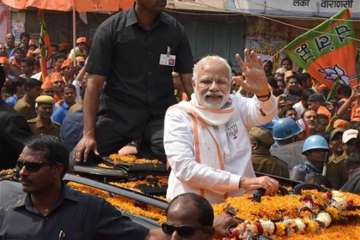Gujarat Assembly polls 2017: High-octane campaign for first phase ends today
The high-octane campaign for the first phase of the crucial Gujarat polls, viewed as a prestige battle for PM Modi and a litmus test for the leadership of soon-to-be Congress chief Rahul Gandhi, will come to an end today.

The high-octane campaign for the first phase of the crucial Gujarat Assembly polls, viewed as a prestige battle for Prime Minister Narendra Modi and a litmus test for the leadership of soon-to-be Congress chief Rahul Gandhi, will come to an end on Thursday.
A total of 89 seats -- out of 182 -- spanning the Saurashtra and South Gujarat regions, are up for grabs in the first phase with 977 candidates in the fray, including Chief Minister Vijay Rupani. Voting will be held on December 9.
While the BJP is fighting anti-incumbency and struggling to alter a seemingly negative perception about demonetisation and the Goods and Services Tax (GST) rollout, the Congress, galvanised by an assertive Rahul Gandhi, has mainly targeted the "hollow Gujarat development model" to slam Modi.
Modi and Gandhi had aggressively led their parties' campaigns in Saurashtra and south Gujarat which often turned personal.
Saurashtra and Kutch are crucial for the ruling BJP as these two regions have the highest concentration of seats in the first phase.
Political pundits believe that the party winning the maximum number of seats from Saurashtra and Kutch will be better placed to form the next government in the state. Saurashtra, located on the Arabian Sea coast, covers 11 districts of the state.
Kutch is the largest district comprising 10 talukas, 939 villages and six municipalities.
Of the 58 seats in Saurashtra and Kutch, the BJP had won 35 in the 2012 Assembly polls and the Congress 20. Of the remaining three seats, two were won by the now-defunct Gujarat Parivartan Party (GPP) of Keshubhai Patel and one by the Nationalist Congress Party (NCP).
In 2007, the tally of the BJP and the Congress in Saurashtra and Kutch stood at 43 and 14 respectively, while the NCP had bagged one seat.
Of the 35 seats spread across the seven districts of south Gujarat, the BJP had won 28 and the Congress six in the 2012 polls. The remaining seat was won by "Others". The 2009 tally for the BJP and the Congress stood at 19 and 14 seats respectively in south Gujarat, while two constituencies had gone to "Others".
Prominent candidates in the fray for the Saturday battle include Rupani, who is contesting from Rajkot (West) against the Congress' Indranil Rajyaguru, Shaktisinh Gohil (Mandvi) and Paresh Dhanani (Amreli) -- both from the Congress. Rajput strongman Gohil has locked horns with the BJP's new face, Virendrasinh Jadeja, also a Rajput, in the Muslim-dominated seat. In Patidar-dominated Amreli, Dhanani (the sitting Congress MLA) is pitted against BJP heavyweight Bavkubhai Undhad, the legislator from the nearby Lathi seat.
The contest for the 12 seats in Surat, the diamond and textile hub of the country, is being viewed as a referendum on the note ban and GST, as the BJP is facing a stiff opposition from the trading community.
During canvassing, Gandhi had interacted with the traders in Surat, who vented their ire against demonetisation and the "complicated GST structure".
Subsequently, the Congress vice-president had attacked the Modi government over the "four-tier" GST structure and sought rationalisation of the indirect tax rates.
For the BJP, Union ministers Arun Jaitley and Smriti Irani had held the fort to defend the GST and note ban, while trying to allay the concerns of the traders and textile merchants during their interactions with them.
On the campaign trail, Modi had addressed about 14 rallies, while Gandhi had spent more than seven days in Saurashtra and south Gujarat, addressing a number of meetings.
BJP president Amit Shah, the chief poll strategist of the saffron party, had also addressed a number of rallies, mainly targeting the Congress and Gandhi.
The BJP had also drafted in Union minister Rajnath Singh, Nirmala Sitharaman, besides Uttar Pradesh Chief Minister Yogi Adityanath, Rajasthan Chief Minister Vasundhara Raje and Madhya Pradesh Chief Minister Shivraj Singh Chouhan.
The Congress had fielded former prime minister Manmohan Singh and prominent leaders such as P Chidambaram, Jyotiraditya Scindia, Sachin Pilot, to name a few, for canvassing.
The campaign mainly shaped up as a duel between Modi and Gandhi, with the latter emerging as the Congress' pivot to take on the might of the prime minister on the latter's home turf.
A big takeaway for the Congress was ensuring the support of the Hardik Patel-led Patidar Anamat Andolan Samiti (PAAS), an umbrella organisation of the numerically strong Patidar community, which traditionally formed the bedrock of the BJP's support in Gujarat.
In its bid to form a caste bloc against the BJP, the Congress won over Alpesh Thakor, Patel and Jignesh Mewani, who have emerged as the young Turks representing the OBCs, Patidars and Dalits respectively.
The Congress, which is in political wilderness in Gujarat for 22 years, is desperate to break the jinx. It has raised issues such as the BJP's "hollow development model", "the prime minister's proximity with select industrialists", besides demonetisation and GST, at the hustings.
The second and final phase of the polls will be held on December 14 and the counting of votes will be taken up on December 18.